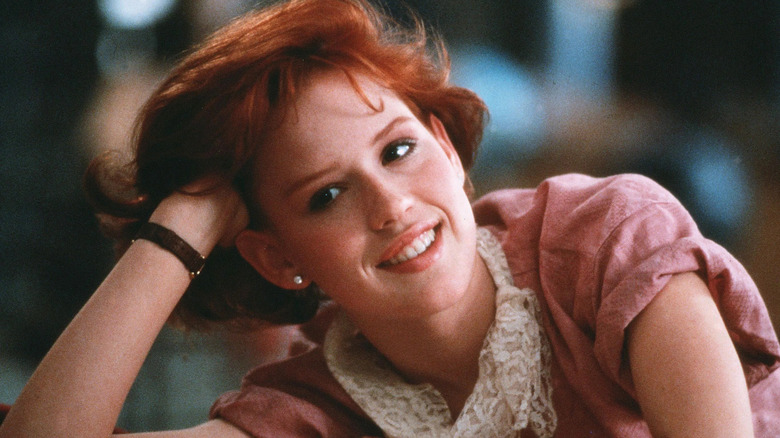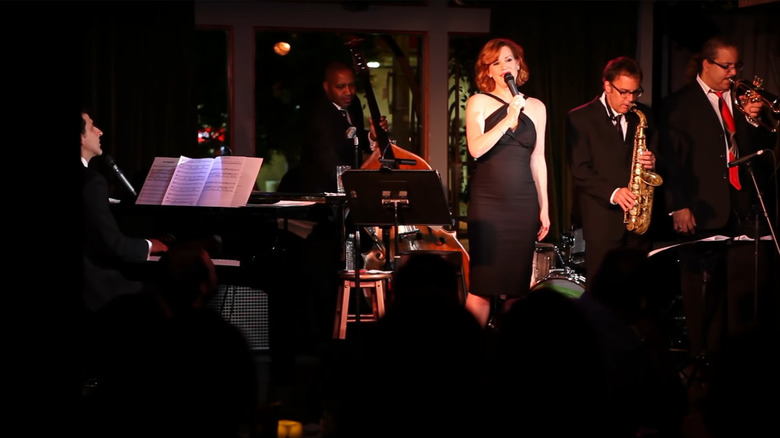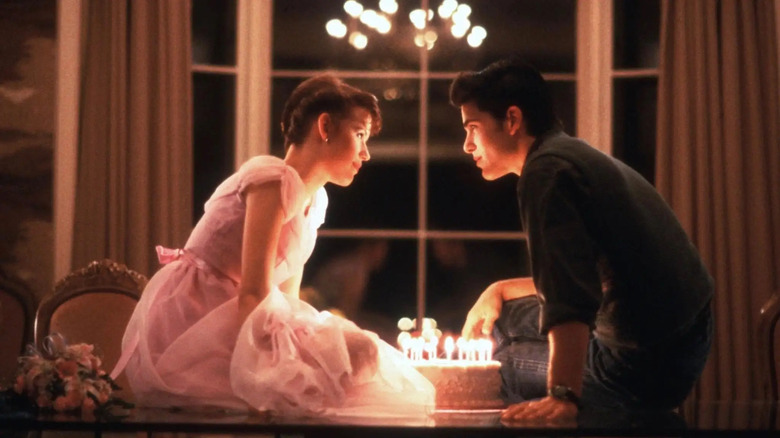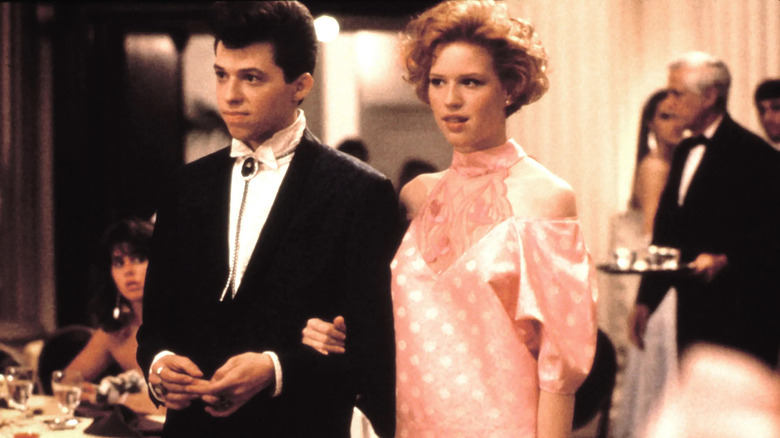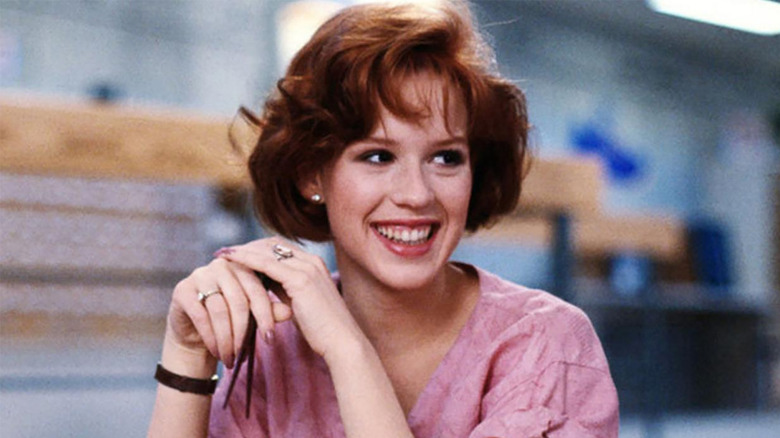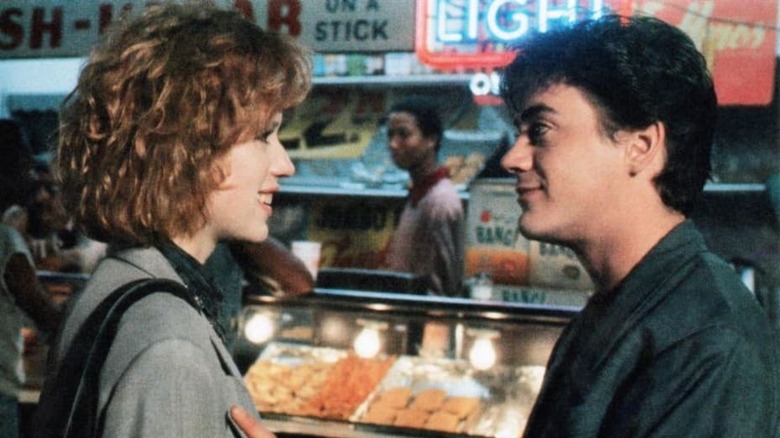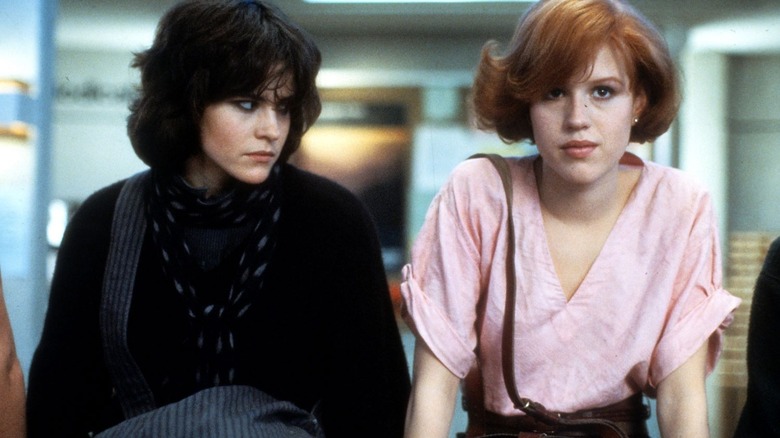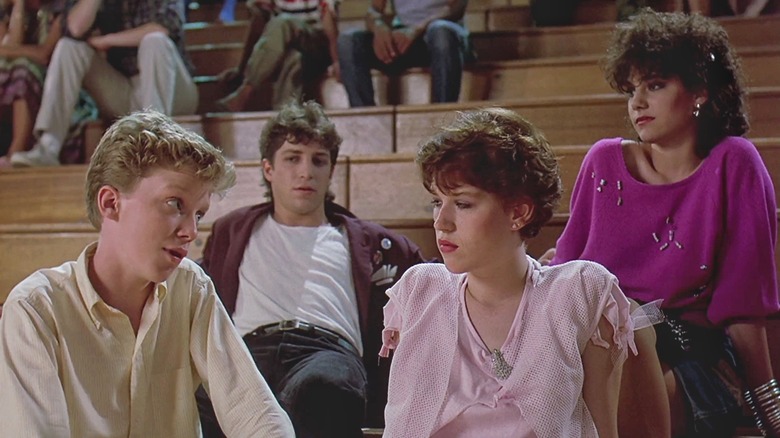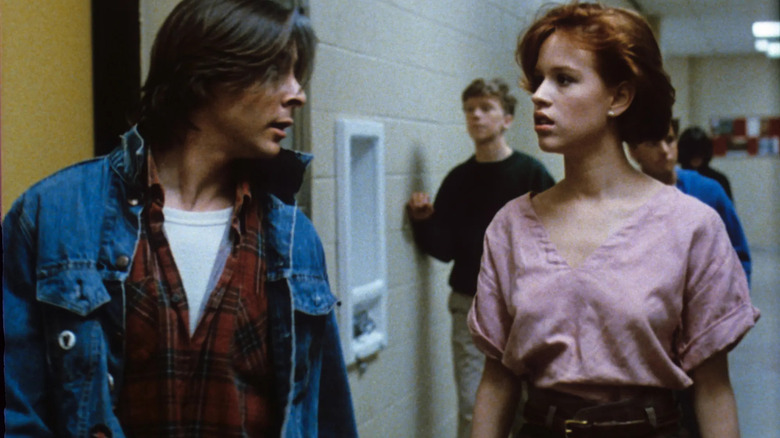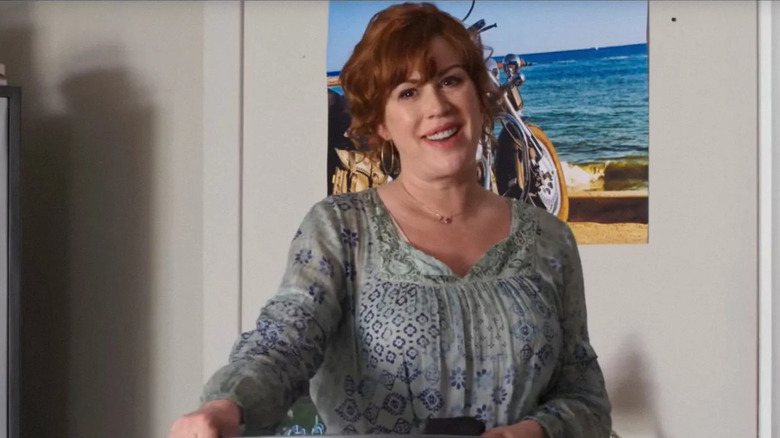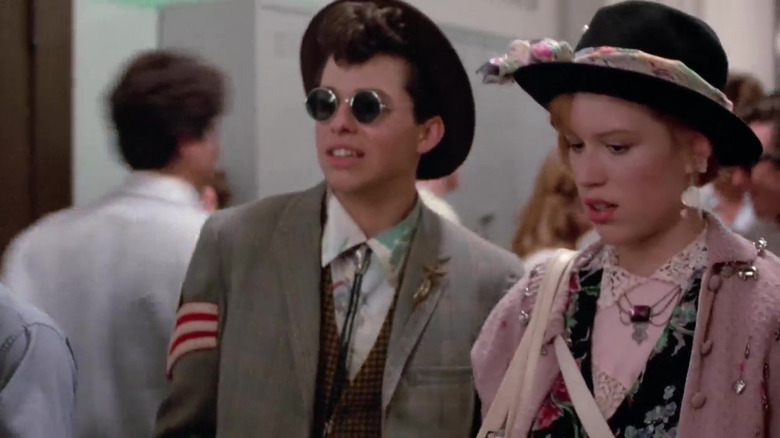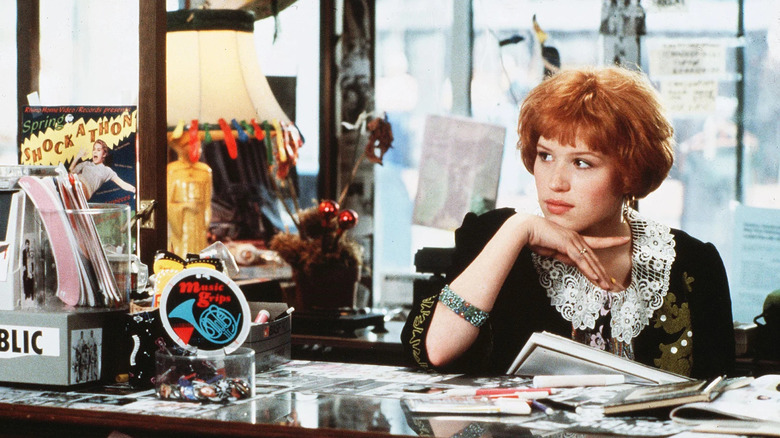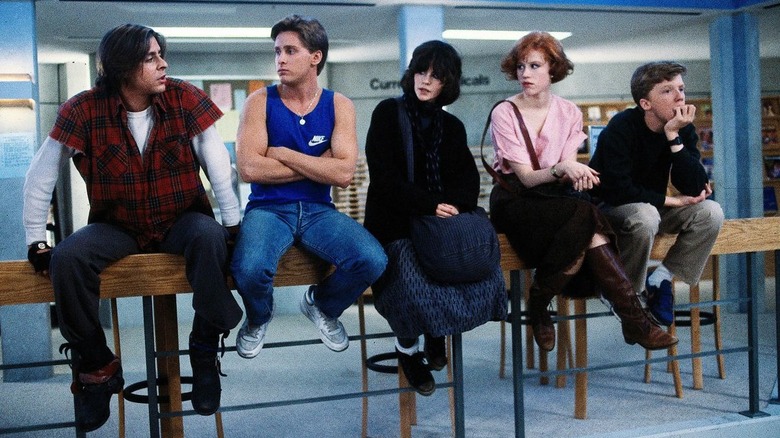The Untold Truth Of Molly Ringwald
The '80s were filled with iconic movies that have remained a part of pop culture for decades, but even in a movie-packed decade, John Hughes' films stand out from the crowd. Movies like "Sixteen Candles," "The Breakfast Club," and "Pretty in Pink" helped define a generation by taking the concerns of teenagers seriously, per MTV. As a writer and director, Hughes deserves plenty of credit for those films, but they also wouldn't exist without one actress in particular: Molly Ringwald.
Ringwald was more than just a member of the Brat Pack. She was Hughes' muse and collaborator. She inspired his films, and her input helped shape them into classics, as seen in her New Yorker piece reflecting on them. Ringwald will always be remembered for her years as a teen star, but she never stopped exercising her passion and creativity. She spent years in France to step away from Hollywood, only to return to the United States to act on the stage, record music, star in films and television, and embark on a successful new career as a writer. You fell in love with Ringwald in "Pretty in Pink" now get to know her untold truth.
She recorded a jazz album
Certain interests and talents seem to run in families, and for the Ringwalds, it's music. Molly Ringwald is the daughter of Adele Edith and jazz pianist Bob Ringwald. Her father led the Fulton Street Jazz Band, which has been recording music since the early 1970s, per The Independent. The actress' exposure to music early from a young age went beyond just hearing her father play: The Fulton Street Jazz Band featured a six-year-old Ringwald on its LP "I Wanna Be Loved By You, Molly Sings," the LA Times reported. She continued to sing with the band off and on for decades.
Eventually Ringwald's interest in jazz music took on a life of its own, and she released her own debut jazz album in 2013. The album, titled "Except Sometimes," features covers of Broadway show tunes and jazz classics. It didn't make a huge splash in the music world, as reviewed by Slant Magazine. However, Ringwald's cover of "Don't You (Forget About Me)," a song tied to the legacy of "The Breakfast Club," did get some attention, via TV Guide. It might not be a genre-defining classic, but for Ringwald's fans, "Except Sometimes" makes for a fun listen.
She was more than John Hughes' muse
Molly Ringwald will forever be associated with John Hughes. It's not just that his films launched her career; she helped him to reach the peak of his own career. Ringwald worked with Hughes on some of his most iconic hits: "Sixteen Candles," "The Breakfast Club," and "Pretty in Pink." In The New Yorker, she acknowledged that many people think of her as Hughes' muse, but said that from her perspective, their relationship was deeper than that because "[she] felt that he listened to [her] — though certainly not all the time." Hughes didn't just use Ringwald as a source of inspiration. He also listened to her opinion on his writing and made changes to his scripts based on what she had to say.
The actress recalled that an early draft of "The Breakfast Club" included a scene where a female gym teacher swims in her pool naked and gets spied on by Mr. Vernon. She convinced Hughes to cut the scene from the final draft of the script. Tingwald told The Atlantic that on another occasion, she mentioned to Hughes that the shooting script for "The Breakfast Club" had been drastically changed from the script she'd initially read. As a response, Hughes brought the actors every version of the movie he'd written and allowed them to piece together the film they wanted to shoot. Without Ringwald as a trusted voice and unofficial editor, Hughes' movies might not become the classics they are today.
She hated the dress in Pretty in Pink
Molly Ringwald's looks in films like "The Breakfast Club" and "Pretty in Pink" have been emulated by fans for decades. Despite her unforgettable fashion sense, Ringwald told the LA Times, "I never thought of myself as a style icon." She credited her style to "necessity," saying, "I wore all that vintage because my parents kept me on an allowance." Wherever it came from, Ringwald's style influenced her films and generations of moviegoers.
Out of all her unforgettable '80s outfits, there's one piece in particular that sticks in her memory because of how much she disliked it. "I really loved everything Marilyn [Vance, the costume designer for 'Pretty in Pink'] did except the prom dress, which I've been pretty open about not liking at the time," Ringwald admitted to Vogue. When she saw the piece for the first time, she burst into tears. "My teacher at the time ... said I was being rude, but it was truly just a visceral reaction."
By the time Ringwald voiced her opposition to the dress, it was too late for the production to make any changes. When the film was done shooting, Ringwald kept every stitch of clothing she wore except that dress. Luckily, audiences fell in love with it, and it remains one of the most memorable costume pieces from the movie. Has Ringwald's opinion of it changed in the intervening years? "Of course," she said, "now I wish I could frame it!"
Her parents were very protective of her
Ringwald landed her first movie role when she was just 13 years old. Growing up as a child star can be difficult, but Ringwald's parents were always close at hand, and her mom wasn't afraid to speak up when she had an issue with what was happening on set. In The New Yorker, Ringwald wrote about a time her mom took charge while they were filming "Sixteen Candles." John Hughes had written a joke for Samantha's father where he asked what had happened to her underwear just after a heartwarming conversation. Ringwald wrote that her mother protested and said, "But it's not funny. It's creepy." Hughes agreed and changed the line to say, "Just remember, Sam, you wear the pants in the family."
That's not to say Ringwald's parents always had the final say. When her mother objected to the scene in "The Breakfast Club" where Bender looks up Claire's skirt (which was shot with an adult actress), the filmmaker decided to keep it in the movie. In another piece for The New Yorker, Ringwald described several instances of being sexually harassed as a teenager by various people on film sets. "All this went on despite my having very protective parents who did their best to shield me," she wrote, adding, "I shudder to think of what would have happened had I not had them."
She wrote a scene for Robert Downey Jr.
Molly Ringwald told Vogue that in the lead-up to shooting "Pretty in Pink," she had pushed for Robert Downey Jr. to play Duckie. Though she wanted Downey as her co-star, Ringwald said, "Once Jon [Cryer] stepped into that role, there was no question that he was the guy." She may have missed her opportunity to work with Downey Jr. on that particular film, but just a year later, she co-starred alongside him in James Toback's comedy "The Pick-Up Artist," via IMDb. Ringwald and Downey Jr. were both still in the early stages of their careers when "The Pick-Up Artist" made its debut, but behind the scenes, one of the film's producers was completely dedicated to helping the two of them grow as artists.
Ringwald shared with the The Atlantic that Warren Beatty worked extensively with her and Downey Jr. on various aspects of the film. He sat down with them and went through the script meticulously, focusing on how to naturally develop their characters. At one point, to help push things even further, Beatty had each of them write an extra scene for the film. Ringwald's writing actually made it into the film. "After I lose all the money and Robert and I are walking in the casino garage, I'm eating Maalox. That's my scene," she said. It was far from the last time Ringwald found herself working as a writer.
She turned down major roles
Acting is an undeniably tough career field. Most actors have rejections pile up before they finally land a part, and plenty of actors have stories of major roles that they just barely missed out on playing. Molly Ringwald had her share of challenges, of course, but she also managed to buck the trend in one major way. Instead of missing a career-altering part, Ringwald actually turned down a major role not once, but twice. Ringwald passed on the opportunity to play the lead in two different 1990 films: "Ghost" and "Pretty Woman" (via LA Times).
To hear Ringwald tell it, she's not at all disappointed to have said no to the films. She told The Atlantic that, at least in the case of "Pretty Woman," the popular version of the story is "a little bit of a myth." She said that in reality, though the script came her way, she was never officially offered the role. Ringwald is happy the part ultimately went to Julia Roberts because "[i]t was a part meant for her, just like there were parts meant for [Ringwald]." Rather than chasing the next big Hollywood film, Ringwald decided to turn her attention to a different part of the world and spent most of the '90s in France.
She spent years in France
You might not know it by looking at Molly Ringwald's acting credits, but in the 1990s she wanted to take a break from Hollywood, and she decided that the best way to get away was to leave the country entirely. "I just wanted to know what it felt like to live life day in and day out without concentrating on a movie career," Ringwald told The Atlantic. She had already been to Paris for work and had become infatuated with the country, its culture, and its language.
It was more than just exhaustion with the daily grind that made Ringwald want to step back from her career. She was also frustrated with the men in Hollywood and how much they could get away with inside the movie business. Ringwald wrote in The New Yorker in a piece titled "All About The Other Harvey Weinsteins" about an audition where the director asked her to read her lines while wearing a collar and leash for no apparent reason. When Ringwald complained about the audition to her agent, he brushed her off, so she "fired him and moved to Paris not long after."
Ringwald's time in France brought some big changes to her life. She learned how to speak the language fluently, and she met her first husband Valery Lameignère (via LA Times). On top of that, fans got to come with her for the journey in some small capacity by watching her French films like "Enfants de salaud" and "Tous les jours dimanche," per IMDb.
She's spoken out about Hollywood's patriarchal culture
Molly Ringwald is someone who speaks her mind and isn't afraid to voice her opinion on important issues. As the #MeToo movement picked up steam, Ringwald decided to open up about her own experiences with men in Hollywood and even with Harvey Weinstein himself. Ringwald worked with Weinstein on the 1990 "Strike It Rich," who she described as a man "noticeably lacking taste himself" and wrote about how he tried to avoid paying her for her work on the film (via The New Yorker). Ringwald also mentioned the many times different men in the movie business sexually harassed her, even as a teenager, and hoped that "Hollywood makes itself an example and decides to enact real change."
In addition to critiquing the men of Hollywood, Ringwald has also investigated the content they create, and she hasn't been shy about reexamining the films that made her famous. In another New Yorker piece revisiting her career through the lens of #MeToo, she acknowledged that John Hughes had a history of misogynistic humor that went back to his days writing for National Lampoon. That style of humor infected Hughes' movies with Bender looking up Claire's skirt in "The Breakfast Club" and Jake trading his girlfriend Caroline in exchange for a pair of underwear in "Sixteen Candles." Ringwald wrote that the films still have much to offer, and she hopes they will continue to be viewed and taught, but, she acknowledged, "[t]he conversations about them will change, and they should."
She's worked as an advice columnist
Molly Ringwald might have made it as an actor when she was still a teenager, but that doesn't mean she's only worked in one career field in her life. Ringwald also has extensive experience as a writer, and she's used her skills to work in several different mediums. Back in September 2014, The Guardian announced that it was revamping the magazine and adding Ringwald to its staff as an advice columnist, via The Guardian. Ask Molly Ringwald had readers writing in with questions about relationships, family struggles, and the desire to move away from home and explore the world like Ringwald had done as a young actress.
Ironically, Ringwald isn't someone who's likely to take advice from anyone in her own life. She told The Atlantic, "I don't think I've ever been good at following other people's advice or counsel. That's not my strong suit. I have a very independent spirit." Readers seemed to agree, however, that giving advice is one of Ringwald's strong suits. In her final piece for the column, Ringwald summed up everything she'd told readers into one piece of simple advice: "listen more, talk more," per The Guardian.
She's an author and translator
For anyone who's already watched all of Molly Ringwald's films and television appearances, there's another way to continue interacting with her approach to art. You can read her books. In an interview with Entertainment Weekly, Ringwald credited the short stories of Raymond Carver with first inspiring her to write for herself. She also admitted to skipping certain novels that are considered classics like "Moby Dick" and "Don Quixote." Those omissions haven't stopped her from becoming a successful author or from branching out as a writer.
Ringwald's first book, "Getting the Pretty Back," with HarperCollins Publishers is a collection of stories and advice about being happier and more fulfilled as an adult. Her next book, again with HarperCollins, was a collection of interlinked short stories titled "When It Happens to You." Both books received mixed reviews — though The New York Times review of "When It Happens to You" believed that the actress could grow as a writer much like she did as a young actress "pushing herself into an unfamiliar realm" — but that hasn't slowed Ringwald down in the slightest. Her most recent project was translating the French novel "Lie With Me" by Philippe Besson into English, which NPR called "beautifully translated."
She views her old movies from a parent's perspective
What happens when a teenage icon grows up? In some ways Molly Ringwald is very much the same person who filmed "Pretty in Pink" more than 30 years ago, but at the same time, her life has completely changed since then. These days Ringwald is a married mother of three, and her life has changed her perspective on those old John Hughes movies. "When I did them it was all about the teenagers," Ringwald said to Yahoo! News, "but now all I can think about is, oh, their poor parents." She's gained some sympathy for the people who have to raise disillusioned teenagers.
On the other hand, as the mother of teenage daughters, Ringwald is still incredibly sympathetic to their experience. "I think it's a lot harder to be a teenager today," she told The Huffington Post. Ringwald believes that social media might "aggravate" all the insecurities and emotional whiplash moments that she once experienced as a teenager. It's not just that the internet doesn't let teenagers escape the pressure of their peers, but also that "[it] makes it harder to focus, so they miss out on a lot of great things." Still, she is optimistic about how today's teenagers are handling the drama of their life, and she has high hopes for her own daughters.
She doesn't like showing her movies to her kids
When they become a parent, every actor has to decide how they're going to introduce their films to their children. For Molly Ringwald, that decision is made even more complicated by how much of an impact her early films with John Hughes have had on Hollywood and pop culture at large. Ringwald has said that she gets particularly nervous about showing her kids those old movies because of the homophobic and misogynistic jokes that stick out so much more in the 21st century than they did back in the '80s (via The Hollywood Reporter). "My 12-year-old daughter, Adele, is the most woke individual that you've ever met, and I just don't know how I'm gonna go through that," she said.
Ringwald talked to The New Yorker about watching "The Breakfast Club" with her oldest daughter when she was 10 years old. "My daughter insisted that her friends had already seen it, and she said she didn't want to watch it for the first time in front of other people." Ringwald had been worried that her daughter would be bothered by some of the film's more uncomfortable jokes, but she said she "hadn't anticipated that it would ultimately be most troubling to me." That's a big part of why Ringwald hasn't watched any more of the films with her children. "I feel like it's a rite of passage and I'm just not ready," she told The Huffington Post.
